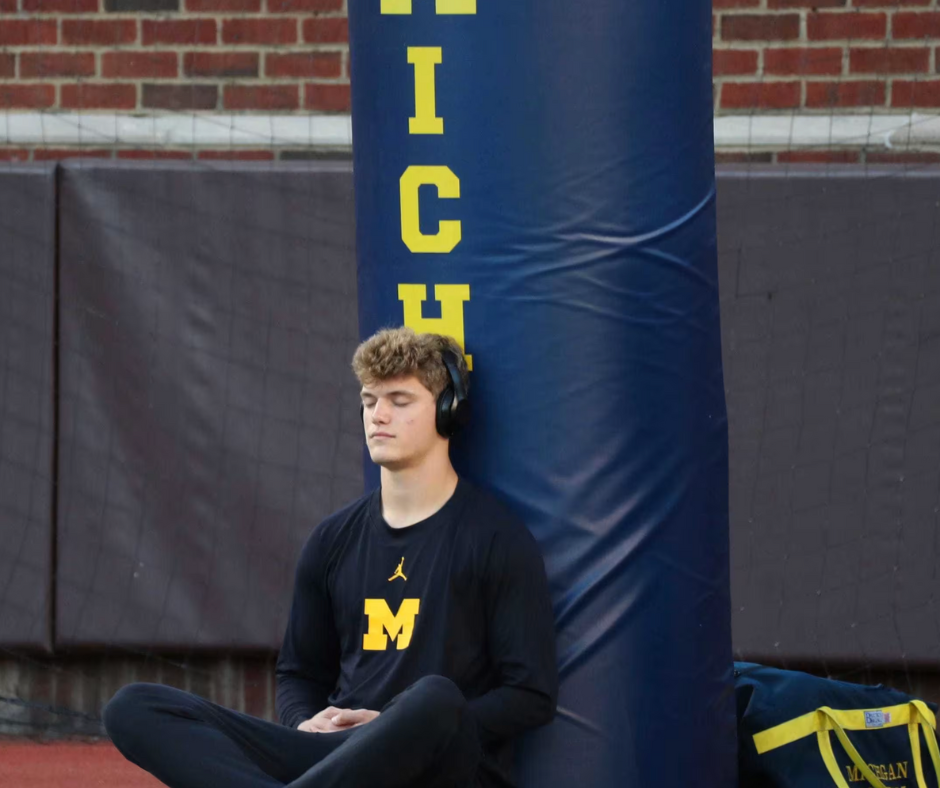Simple Mindfulness Routines For Your Athlete
Simple Mindfulness Routines For Your Athlete. Youth sports can be a whirlwind of practices, games, and academic pressures. It’s easy for student-athletes to feel overwhelmed, leading to stress and burnout. This is where mindfulness comes into play. By incorporating mindfulness practices into your young athlete’s routine, you can help them manage stress, enhance performance, and enjoy their sports experience more fully.
Why Mindfulness Matters for Student Athletes
Mindfulness, the practice of staying present and fully engaging in the moment, offers numerous benefits for student-athletes:
- Reduces Stress: Mindfulness techniques teach athletes to manage stress by focusing on the present rather than worrying about past mistakes or future outcomes.
- Enhances Performance: Mindfulness helps athletes stay focused during training and competition by improving concentration and mental clarity.
- Boosts Resilience: Mindfulness fosters emotional resilience, enabling athletes to bounce back quickly from setbacks.
- Promotes Well-being: Practicing mindfulness can improve overall mental health, leading to greater well-being and life satisfaction.
Statistics That Highlight the Importance of Mindfulness
- According to a study published in the Journal of Sport Rehabilitation, athletes who practiced mindfulness reported lower levels of anxiety and improved athletic performance.
- The American Psychological Association states that mindfulness can significantly reduce stress and improve mood and quality of life.
Simple Mindfulness Routines for Your Athlete
Here are simple, step-by-step practices designed to fit into a busy schedule. Have them choose one, choose them all, or choose whatever works best.
1. Mindful Breathing or Meditation (5 Minutes)
Doing this one small thing will allow your athlete to get their day started right. It only takes five minutes and the benefits will last the entire day.
-
- Find a Comfortable Space: Have your child sit comfortably on the floor, flat on their bed, or in a chair—whatever works best for them. There is no wrong place to meditate.
- Breathe Deeply: Instruct them to take slow, deep breaths, inhaling through the nose and exhaling through the mouth.
- Focus on the Breath: Encourage them to focus on the sensation of the breath entering and leaving their body, letting go of any distracting thoughts. When thoughts come in, this is normal, and what happens to EVERYONE; just visualize them floating away and return to focusing on the breathing.
2. Body Scan Meditation (10 Minutes)
A body scan meditation helps athletes become more aware of their physical state and helps to release tension.
-
- Lie Down Comfortably: Have your child find a comfortable position, such as the bed, the floor, or anywhere else they like.
- Scan the Body: Starting from the toes and moving up to the head, guide them to focus on each part of their body, noticing any areas of tension and consciously relaxing them.
3. Journaling (5 Minutes)
Encourage your student-athlete to spend a few minutes reflecting on their day each evening or before school.
-
- Express Thoughts and Feelings: Have them write down what went well, what they found challenging, and how they felt throughout the day or the day before.
- Set Positive Intentions: Encourage them to end their journaling session by setting a positive intention for the next day or that day.
4. Gratitude Practice (5 Minutes)
Cultivating gratitude has been proven to boost mood and perspective.
-
- List Three Things: Before bed, have your child list three things they’re grateful for that day.
- Reflect: Encourage them to reflect on why they are grateful for these things and how they made them feel.
5. Mindful Stretching (10 Minutes)
Incorporate mindfulness into their physical warm-up routine.
-
- While stretching, have them focus on how each muscle feels. This will prepare their bodies for physical activity and help them tune into the present moment.
6. Visualization (10 Minutes)
Visualization is a powerful tool for athletes, and science shows that when done right, your brain doesn’t know the difference between actual practice and visualization. In tests done, athletes have added muscle and strength simply through visualization. Do this right before a game or anytime.
-
- Imagine Success: Have your child sit quietly and visualize themselves performing well from the first-person perspective. They should imagine every detail—from the ball’s feel to the crowd’s roar.
- Engage the Senses: Encourage them to imagine the sights, sounds, and feelings associated with their success. This will help make the visualization more vivid and impactful.
7. Mindful Eating (10 Minutes)
Nutrition plays a crucial role in an athlete’s performance, and the earlier they can cultivate a positive relationship with food and eating, the better.
-
- Pay attention to the flavors, textures, and smells of their food. This practice can help them develop a healthier relationship with food and ensure they are fueling their bodies properly.
- Slow down. Encourage them to sit and eat, not rush out the door with a quick snack. The slower you eat, the better you are able to digest the food, and the fuller you will feel.
